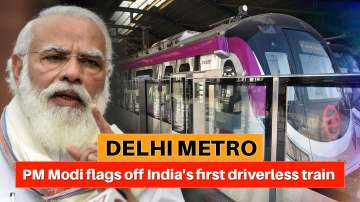PM Modi flags off India's first-ever driverless metro train in Delhi, launches National Common Mobility Card
By 2025, metro train services will be expanded to over 25 cities across the country, said Prime Minister Narendra Modi while adding that "Make In India" is essential for the expansion.

Prime Minister Narendra Modi on Monday inaugurated India's first-ever driverless train on Delhi Metro's Magenta Line. The prime minister also launched National Common Mobility Card on the Airport Express Line, via video conferencing. At the event, Prime Minister Modi said, "The inauguration of the first driverless metro train shows how fast India is moving towards smart systems. Today Delhi Metro is being connected to the National Common Mobility Card. A few decades ago, when the impact of urbanisation and the future of urbanisation were both clear, the country saw a different attitude."
There was not much attention about the needs of the future, half-hearted work was done, confusion persisted, he added.
"Unlike this, modern thinking says that urbanisation should not be seen as a challenge and used as an opportunity. An opportunity in which we can build better infrastructure in the country. An opportunity through which we can increase Ease of Living. This difference of thinking is seen in every dimension of urbanization," said PM Modi.
In 2014, only five cities had a metro rail. Today, metro rail services are available in 18 cities, the prime minister stated.
"By the year 2025, we are going to expand it to more than 25 cities. In 2014, only 248 km of metro lines were operational in the country. Today it is about three times more than seven hundred kilometers. By the year 2025, we are trying to expand it to 1,700 kilometers," he added.
These are not just figures, they are proof of Ease of Living coming in the lives of crores of Indians, PM said. "This is not just infrastructure made of brick and stone, concrete and iron, but are evidence of the fulfillment of the aspirations of the citizens of the country, the middle class of the country," he added.
READ MORE: India’s first driverless train in Delhi: All you need to know
"Our government formulated the metro policy and implemented it with an all-round strategy. We insisted on working according to local demand, we emphasised on promoting local standards, Make in India expansion, the use of modern technology," said PM Modi.
Delhi Chief Minister Arvind Kejriwal also attended the event.
Metro services to reach over 25 cities by 2025: PM
By 2025, metro train services will be expanded to over 25 cities across the country, said Prime Minister Narendra Modi while adding that "Make In India" is essential for the expansion.
"The first metro in the country was started with the efforts of Atal Ji. When our government was formed in 2014, only five cities had metro services and today 18 cities have metro rail services. By 2025, we will take this service to more than 25 cities," said PM Modi.
"Make In India is very important for the expansion of metro services. It reduces cost, saves foreign currency and provides more employment to people," he added.
"We noted that the expansion of the metro, modern modes of transport should be used according to the needs of the people of the city and the professional lifestyle there," the PM said.
This is the reason why work is being done on different types of metro rails in different cities, he said.
"Delhi-Meerut RRTS will reduce the distance between Delhi and Meerut to less than an hour. MetroLight - In cities where passenger numbers are less, work is being done on the MetroLite version. It is prepared at 40 per cent cost of the normal metro," said PM Modi.
"Work is also being done on Metro Neo in the cities where the ridership is less. It is built at the cost of 25 per cent of the normal metro. Similarly, water metro - this is also an example of out of the box thinking," he added.
Today, four big companies are manufacturing metro coaches in the country and dozens of companies are engaged in the manufacture of metro components. This is helping Make in India as well as the campaign for self-reliant India, the prime minister stated.
"We are also using a braking system in which 50 per cent of the energy goes back into the grid when the brakes are applied. Today 130 MW of solar power is being used in metro rail, which will be increased to 600 MW," said PM Modi.
"Providing the same standards and facilities for modernisation is very important. The Common Mobility Card at the national level is a major step in this direction. Wherever you travel, whichever public transport you travel, this one card will give you integrated access," he added.
Today, by consolidating all the systems, the strength of the country is being increased. Like One Nation, One Mobility Card, our government has done many things in the past years to integrate the systems of the country, the prime minister said.
"One Nation, One Fastag has made travel seamless on highways across the country. One Nation, One Tax i.e. GST has ended the tax net across the country. One Nation, One Power Grid, is ensuring adequate and continuous power availability in every part of the country. Power loss is reduced," said PM Modi.
One Nation, One Gas Grid, is ensuring Seamless Gas Connectivity of the parts where gas-based life and economy used to be a dream earlier, the Prime Minister said.
One Nation, One Health Assurance Scheme i.e. millions of people from Ayushman India are taking advantage of this anywhere in the country, he further stated.
"Citizens moving from one place to another because of One Nation, One Ration Card, have got freedom from the cycle of making new ration cards. Similarly, the country is moving in the direction of One Nation, One Agriculture Market with new agricultural reforms and arrangements like e-NAM," he said.